Teaching children about grief and healing
Teaching children about grief and healing

The death of a family pet is often a child’s first encounter with loss — a painful but valuable opportunity for parents to teach about death and healthy grieving, according to psychologists and grief counselors.
Experts say the way caregivers handle such loss can shape how children understand and cope with grief later in life. “People are so adverse to talking about death, but it’s something we all face,” said Deirdra Flavin, CEO of the National Alliance for Children’s Grief.
Children process loss differently depending on their age and personality. Some experience deep sadness or fear, while others may struggle to express emotions. Using clear and honest language — avoiding euphemisms like “went to sleep” — helps prevent confusion, especially among younger kids.
Counselors emphasize that it’s normal for children to feel intense emotions and that adults should acknowledge their own grief openly. “It’s OK for kids to see parents feeling sad,” said psychologist Raquel Halfond. “It helps them understand those feelings are natural.”
Experts recommend creating closure through small rituals, such as holding a pet funeral, drawing pictures, or remembering happy moments. These acts help children accept the finality of death and find comfort in lasting memories.


